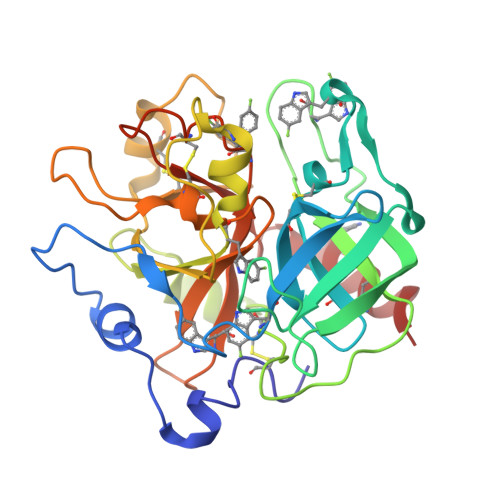19F NMR reveals the conformational properties of free thrombin and its zymogen precursor prethrombin-2.
Ruben, E.A., Gandhi, P.S., Chen, Z., Koester, S.K., DeKoster, G.T., Frieden, C., Di Cera, E.(2020) J Biological Chem 295: 8227-8235
- PubMed: 32358061
- DOI: https://doi.org/10.1074/jbc.RA120.013419
- Primary Citation of Related Structures:
6V5T, 6V64 - PubMed Abstract:
The conformational properties of trypsin-like proteases and their zymogen forms remain controversial because of a lack of sufficient information on their free forms. Specifically, it is unclear whether the free protease is zymogen-like and shifts to its mature form upon a ligand-induced fit or exists in multiple conformations in equilibrium from which the ligand selects the optimal fit via conformational selection. Here we report the results of 19 F NMR measurements that reveal the conformational properties of a protease and its zymogen precursor in the free form. Using the trypsin-like, clotting protease thrombin as a relevant model system, we show that its conformation is quite different from that of its direct zymogen precursor prethrombin-2 and more similar to that of its fully active Na + -bound form. The results cast doubts on recent hypotheses that free thrombin is zymogen-like and transitions to protease-like forms upon ligand binding. Rather, they validate the scenario emerged from previous findings of X-ray crystallography and rapid kinetics supporting a pre-existing equilibrium between open (E) and closed (E*) forms of the active site. In this scenario, prethrombin-2 is more dynamic and exists predominantly in the E* form, whereas thrombin is more rigid and exists predominantly in the E form. Ligand binding to thrombin takes place exclusively in the E form without significant changes in the overall conformation. In summary, these results disclose the structural architecture of the free forms of thrombin and prethrombin-2, consistent with an E*-E equilibrium and providing no evidence that free thrombin is zymogen-like.
- Edward A. Doisy Department of Biochemistry and Molecular Biology, Saint Louis University School of Medicine, St. Louis, Missouri, USA.
Organizational Affiliation:



















